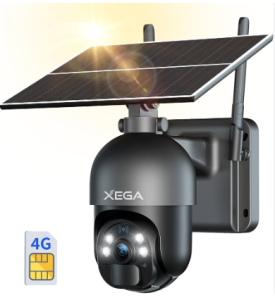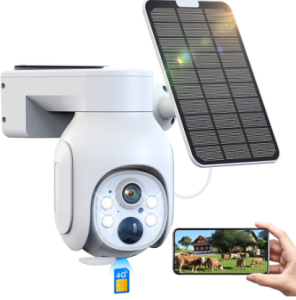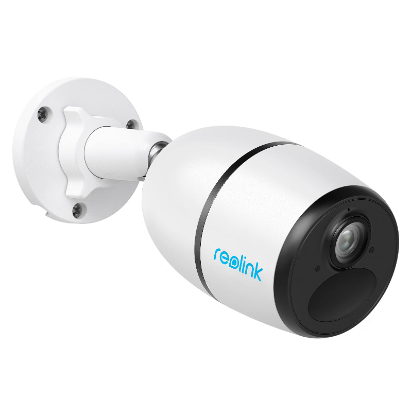Cellular Security Cameras
In today’s rapidly evolving world, security and peace of mind have never been more important. Whether you’re monitoring your home, office, or remote property, cellular security cameras have become indispensable tools for ensuring safety and protection. These innovative devices offer flexibility, convenience, and reliability, making them an ideal choice for both residential and commercial applications. In this comprehensive guide, we will explore the best cellular security cameras available in the market, highlighting their features, benefits, and how they can enhance your security setup.
The Rise of Cellular Security Cameras
Traditional security cameras have always relied on wired connections or Wi-Fi networks for transmitting data and footage. While these methods work well in many situations, they come with limitations. Wired systems can be costly and challenging to install, and Wi-Fi networks may suffer from connectivity issues, especially in remote or outdoor locations. Cellular security cameras have emerged as a solution to these problems, offering several advantages:

Wireless Freedom: Cellular cameras are truly wireless, eliminating the need for complex wiring and installation. This makes them suitable for both indoor and outdoor settings.
Remote Monitoring: With a cellular connection, you can access your camera’s live feed and recorded footage from anywhere, as long as you have cellular signal coverage. This level of remote monitoring is invaluable for home and business owners.
Reliability: Cellular networks are known for their reliability, ensuring that your security camera is always online and ready to capture crucial events.
Coverage in Remote Areas: Unlike Wi-Fi, which requires a nearby access point, cellular signals are often available in remote and off-grid locations, making them suitable for monitoring properties in rural areas or construction sites.
Arlo Go
The Arlo Go is a top-notch cellular security camera that offers impressive features. It operates on 4G LTE and boasts a weather-resistant design, making it suitable for outdoor use. With 720p HD video quality and night vision capabilities, it captures clear footage day and night. The Arlo Go also features motion detection, two-way audio, and a long-lasting rechargeable battery, making it a versatile option for various security needs.
Reolink Go
The Reolink Go is a versatile cellular security camera designed for both indoor and outdoor use. It supports 3G and 4G LTE connections and offers 1080p full HD video quality with starlight night vision. The camera’s solar panel and rechargeable battery ensure continuous operation, even in areas with limited sunlight. It also features smart motion detection and remote viewing via a user-friendly app.
Nest Cam with LTE
Nest, known for its smart home products, offers a cellular version of its popular security camera. The Nest Cam with LTE connects to the Verizon cellular network, providing reliable coverage. It delivers crisp 1080p video quality, two-way audio, and advanced features like facial recognition. Integration with the Nest ecosystem allows for seamless smart home automation.
Verizon 4G LTE Home Monitoring Camera
Verizon offers its own 4G LTE home monitoring camera, which can be a convenient choice if you’re already a Verizon customer. It provides 1080p HD video quality, motion detection, and night vision. The camera is easy to set up and control via the Verizon Home app, offering a straightforward solution for home security.
Blink XT2 Outdoor/Indoor Smart Security Camera
While the Blink XT2 primarily relies on Wi-Fi, it offers an optional 4G LTE module that can be added for cellular connectivity. This makes it a flexible choice for areas with unreliable Wi-Fi. The camera provides 1080p HD video quality, two-way audio, and customizable motion detection zones. It also boasts an impressive two-year battery life.
Choosing the Right Cellular Security Camera
When selecting a cellular security camera, several factors should influence your decision:
Network Compatibility: Ensure that the camera is compatible with the cellular network providers in your area. Different cameras may work with specific carriers, so check for compatibility before making a purchase.

Video Quality: Consider the camera’s video resolution and whether it meets your requirements. Higher resolution cameras provide clearer images, which can be crucial for identifying details in footage.
Power Source: Some cellular cameras come with rechargeable batteries, while others may require a constant power source or solar panels. Choose the one that suits your installation location and preferences.
Night Vision: If you need 24/7 surveillance, look for cameras with infrared or starlight night vision capabilities for clear footage in low-light conditions.
Remote Access: Evaluate the mobile app or software that accompanies the camera. It should provide easy remote access, live streaming, and the ability to review recorded footage.
Storage Options: Determine how the camera stores and manages video footage. Some cameras offer cloud storage, while others use onboard SD cards. Consider which option aligns with your storage needs and preferences.
Additional Features: Explore any extra features that may be important to you, such as two-way audio, motion detection sensitivity settings, and compatibility with smart home systems.
How to Choose the Best Cellular Security Cameras
Choosing the best cellular security camera is a critical decision when it comes to safeguarding your home or property. These cameras offer the flexibility of remote monitoring and can function in areas where traditional Wi-Fi connections may be unreliable or nonexistent. To ensure you make the right choice, this guide will walk you through the essential factors to consider when selecting the best cellular security camera for your specific needs.
Network Compatibility
The first step in choosing a cellular security camera is to check for network compatibility. These cameras typically operate on 3G, 4G LTE, or even 5G networks. Ensure that the camera you are interested in is compatible with the cellular network providers available in your area. Some cameras may work with specific carriers, so it’s crucial to verify compatibility before making a purchase.
Video Quality
The video quality of a security camera is paramount for capturing clear and detailed footage. Look for cameras that offer high-resolution video, such as 1080p or higher. Higher resolution ensures that you can identify faces, license plates, or other critical details in the recorded footage. Some advanced cameras even offer 4K video quality for the utmost clarity.
Power Source
Cellular security cameras come with various power options, and your choice will depend on the location and purpose of the camera:
Battery-Powered: Many cellular cameras come with rechargeable batteries. These are ideal for locations where running power cables is impractical or inconvenient. Check the battery life and whether the camera supports easy battery replacement.
Solar-Powered: Some cameras have built-in solar panels that keep the battery charged using sunlight. These are excellent for outdoor surveillance in sunny locations and provide uninterrupted operation.
Hardwired: Certain installations may require constant power, in which case you’ll need a camera that can be hardwired to a power source.
Night Vision
Effective night vision is essential for 24/7 surveillance. Look for cameras equipped with infrared (IR) LEDs or starlight night vision technology. IR LEDs emit invisible infrared light, illuminating the area for the camera to capture clear footage in complete darkness. Starlight technology, on the other hand, allows cameras to produce color images in low-light conditions, providing superior image quality.
Remote Access and Mobile App
A user-friendly mobile app or software is crucial for seamless remote monitoring. The app should allow you to:
Access live camera feeds in real-time.
Receive push notifications for motion detection or other events.
Review and download recorded footage.
Adjust camera settings and configurations remotely.
Ensure that the camera you choose is compatible with your smartphone or tablet and has a user-friendly app that suits your preferences.
Storage Options
Cellular security cameras use various methods for storing and managing video footage:
Cloud Storage: Some cameras offer cloud storage plans where your footage is securely stored in the cloud. This is convenient for accessing footage from anywhere and provides a backup in case the camera is tampered with or stolen.
Local Storage: Many cameras come with onboard SD card slots, allowing you to store footage locally. Be sure to check the maximum supported SD card capacity.
Network Attached Storage (NAS): Advanced users may prefer cameras that support NAS integration, allowing them to store footage on their network-attached storage devices.
Choose a storage option that aligns with your needs and preferences.
Additional Features
Consider any extra features that may enhance your surveillance experience:
Two-Way Audio: Cameras with two-way audio allow you to communicate with people near the camera, which can be handy for remote intercom functionality.
Motion Detection: Most security cameras offer motion detection, but the sensitivity and customization options can vary. Look for cameras with adjustable motion detection settings to reduce false alarms.
Compatibility with Smart Home Systems: If you have a smart home ecosystem, check if the camera integrates with your existing devices and platforms, such as Amazon Alexa, Google Assistant, or Apple HomeKit.
Pan and Tilt: Some cellular security cameras come with pan-and-tilt functionality, allowing you to remotely adjust the camera’s viewing angle.
Conclusion
Cellular security cameras have revolutionized the way we approach home and business security. With their wireless convenience, reliability, and remote monitoring capabilities, they offer peace of mind like never before. The options mentioned in this guide represent some of the best cellular security cameras available, each with its own set of features to cater to different security needs.
Before making a final decision, thoroughly research the cameras that align with your requirements and budget. The right cellular security camera can significantly enhance your security setup, ensuring that you are always connected and informed about the safety of your property, loved ones, and assets, regardless of your location or the time of day.
What is a cellular security camera, and how does it differ from traditional security cameras?
A cellular security camera is a wireless surveillance device that uses cellular networks (3G, 4G LTE, or 5G) to transmit data and footage. Unlike traditional cameras that rely on Wi-Fi or wired connections, cellular cameras offer greater flexibility and can operate in areas with poor or no Wi-Fi signal. They are ideal for remote locations, outdoor use, and places where wiring is challenging.
What are the advantages of using cellular security cameras?
Cellular security cameras offer several advantages, including:
Wireless freedom: No need for complex wiring.
Remote monitoring: Access live feeds and recorded footage from anywhere.
Reliability: Cellular networks provide stable connections.
Coverage in remote areas: Suitable for properties in rural or off-grid locations.
How do I choose the right cellular security camera for my needs?
Choosing the right cellular security camera involves considering factors like network compatibility, video quality, power source (battery, solar, or hardwired), night vision capabilities, remote access options, storage methods (cloud, local, NAS), and additional features like two-way audio and smart home integration. Assess your specific security requirements and preferences to make an informed choice.
Are cellular security cameras secure and private?
Cellular security cameras are generally secure when configured correctly. They use encryption to protect data transmission. However, it’s essential to follow best security practices, such as setting strong passwords and regularly updating firmware, to minimize vulnerabilities. Additionally, consider cameras that offer end-to-end encryption for enhanced privacy.
Can I use a cellular security camera as a standalone system, or do I need additional equipment?
Cellular security cameras can function as standalone systems, but their effectiveness can be enhanced with additional equipment. For a comprehensive security setup, you may want to consider options like cloud storage subscriptions, solar panels for extended battery life, or the integration of multiple cameras to cover larger areas. Assess your specific needs and budget to determine if any supplementary equipment is necessary.
